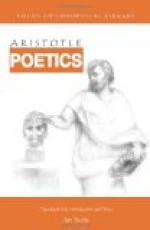A well constructed plot should, therefore, be single in its issue, rather than double as some maintain. The change of fortune should be not from bad to good, but, reversely, from good to bad. It should come about as the result not of vice, but of some great error or frailty, in a character either such as we have described, or better rather than worse. The practice of the stage bears out our view. At first the poets recounted any legend that came in their way. Now, the best tragedies are founded on the story of a few houses, on the fortunes of Alcmaeon, Oedipus, Orestes, Meleager, Thyestes, Telephus, and those others who have done or suffered something terrible. A tragedy, then, to be perfect according to the rules of art should be of this construction. Hence they are in error who censure Euripides just because he follows this principle in his plays, many of which end unhappily. It is, as we have said, the right ending. The best proof is that on the stage and in dramatic competition, such plays, if well worked out, are the most tragic in effect; and Euripides, faulty though he may be in the general management of his subject, yet is felt to be the most tragic of the poets.
In the second rank comes the kind of tragedy which some place first. Like the Odyssey, it has a double thread of plot, and also an opposite catastrophe for the good and for the bad. It is accounted the best because of the weakness of the spectators; for the poet is guided in what he writes by the wishes of his audience. The pleasure, however, thence derived is not the true tragic pleasure. It is proper rather to Comedy, where those who, in the piece, are the deadliest enemies—–like Orestes and Aegisthus—quit the stage as friends at the close, and no one slays or is slain.
XIV
Fear and pity may be aroused by spectacular means; but they may also result from the inner structure of the piece, which is the better way, and indicates a superior poet. For the plot ought to be so constructed that, even without the aid of the eye, he who hears the tale told will thrill with horror and melt to pity at what takes place. This is the impression we should receive from hearing the story of the Oedipus. But to produce this effect by the mere spectacle is a less artistic method, and dependent on extraneous aids. Those who employ spectacular means to create a sense not of the terrible but only of the monstrous, are strangers to the purpose of Tragedy; for we must not demand of Tragedy any and every kind of pleasure, but only that which is proper to it. And since the pleasure which the poet should afford is that which comes from pity and fear through imitation, it is evident that this quality must be impressed upon the incidents.
Let us then determine what are the circumstances which strike us as terrible or pitiful.




